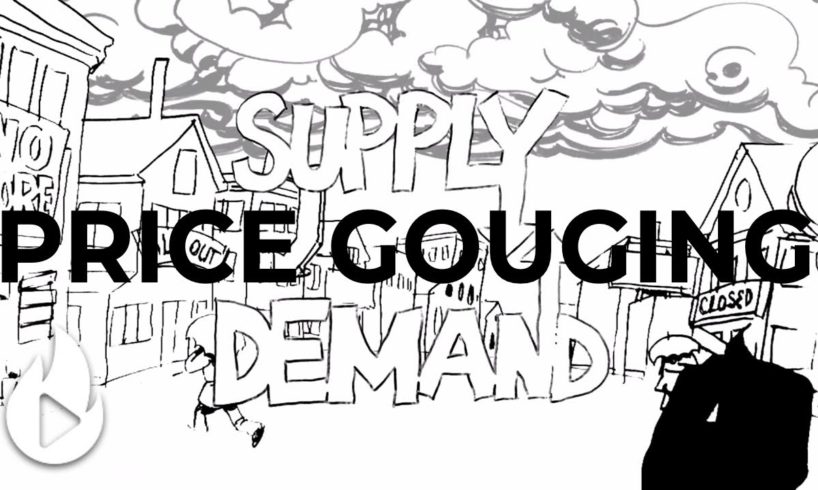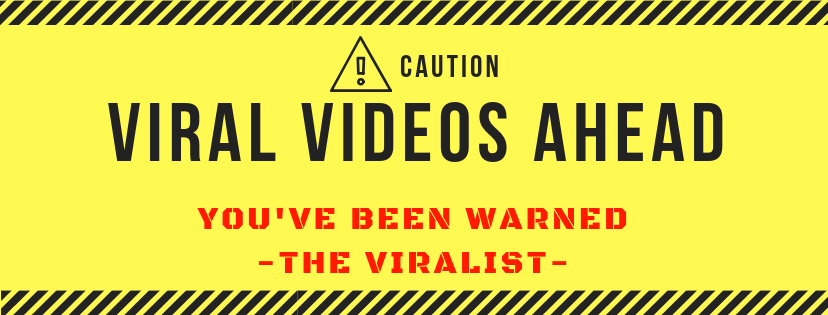
As a result of the COVID-19 pandemic, there’s been a strong effort to curtail price gouging on items such as hand sanitizer and medical face masks.
What doesn’t get said enough, however, is that forcibly restricting prices from rising above a certain threshold will not in itself influence the market conditions that drive prices up.
Price gouging encourages competition by pressuring manufacturers and distributors to increase production, which over time, would actually drive down costs. Price controls during a time of crises, however, do nothing to address the shortage problem.
SUBSCRIBE: http://bit.ly/32HUbvt
TRANSCRIPT SNIPPETS:
Is asking $1300 for the generator morally wrong? Of course, you’d rather buy it from me for $800, but there are three reasons why my charging a higher price isn’t obviously wrong.
First, remember, you don’t have to buy it from me for $1300. If that’s more than you think the generator is worth, you’re free to walk on by. If you do decide to pay, it’s because you believe you’re getting more value out of the generator than you do for the $1300 you gave up for it.
Scond, ask yourself what would happen if I did charge only $800 for the generator. Remember you aren’t the only person who needs electric power in this situation. If the price was lower, would the generator still have been there when you tried to buy it? Or would someone else have snatched it up before you ever had a chance?
This leads directly to the third point, which is that high prices do more than just line sellers’ pockets. They also affect how buyers and sellers behave. For buyers, high prices reduce demand and encourage conservation. They lead buyers to ask themselves whether they really need that generator, or whether they can do without.
And by doing so, they allow at least some of those resources to be conserved for other people who might need them more, and therefore are willing to pay more. And for sellers, high prices encourage people to bring more goods to where they’re needed.
If generators can be bought in an area not affected by a hurricane for $800, and resold later for $1300, that creates a profit incentive for people to bring generators from where they’re less needed to where they’re more needed to get them to where they’ll do more good for people who need them most.
All of this leads to a surprising conclusion. Even someone who can’t afford to pay $1300 for a generator benefits from a system in which sellers are allowed to charge that price.
That’s because the profit motive that that system creates encourages competition, which increases supply, and ultimately, drives down prices to a more affordable level for everyone.
Now it’s true that when price gouging is legal, some people won’t be able to afford the higher prices that result. But ask yourself, what alternative institutions would do better?
When price gouging is prohibited, goods usually go to whoever shows up first. If you care about distributed justice, is that really a better system? I think there are good reasons to doubt that price gouging is immoral.
But suppose you’re not convinced. Suppose you think price gouging is exploitative and wrong. Should it be illegal? The answer, even if we assume price gouging is immoral, is almost certainly that it should not be illegal. If price gouging is wrong, it’s because it hurts people in vulnerable situations. But then, the last thing you want to do is hurt those vulnerable people even more.
Remember, the only reason price gouging occurs is because a disaster causes demand for certain goods to go up and supply to go down, with the result that there isn’t enough stuff to go around. Anti-gouging laws don’t do anything to address this underlying shortage.
In fact, they make it worse by destroying incentives for conservation and increasing supply. So even if you think that price gouging is morally wrong, and that merchants should refuse to engage in it, making it illegal doesn’t make sense. It hurts the very people who need our help most.
FOLLOW US ON SOCIAL MEDIA:
https://www.facebook.com/LearnLiberty/
Tweets by LearnLiberty
https://www.instagram.com/learnliberty/
LEARN LIBERTY:
Learn Liberty is an educational hub where you can explore the ideas of a free society. We look at the big questions about what makes a society prosper and how we can make the world a freer place for all. We don’t have all the answers – but we’ve got a lot of ideas. We work with professors from a range of backgrounds while giving them a platform to share their own opinions. In 2019, Learn Liberty was acquired by Students For Liberty from the Institute for Humane Studies. Learn more at https://www.learnliberty.org/
source







all naysayers stop pretending that you somehow are more ethical and moral because you want lower prices. keep your feelings away from the goods that I want to buy at the market price. supply is always finite. understand that and your life will magically improve.
This sounds like a exploiter's excuse to take advantage of vulnerable people amidst a crisis. Price gouging laws in times of national emergency are good. Believe me, if one distributer were allowed to charge $10 for a roll of toilet paper, they all would, and if you don't believe that, you're too young to remember any other national crises other than the current crisis we're facing right now.
So just talking about toilet paper here, imagine you go to Walmart right now and you clear their shelves of TP with the intention to price gouge it somewhere where there is a shortage. Wouldn’t you then have caused a shortage in your area? Especially in a rural area where there’s only one Walmart for miles around? The only way you could justify that then is that you were trying to make a profit, which is not inherently bad. But you can’t ignore the fact that you’ve caused a shortage in your area for a considerable amount of time considering supply chains are backed up. Am I missing something? The video seems to perform a lot of mental gymnastics for a hypothetical long run.
Nice haircut Prof!
BS. The astronomic increase in price only hurts those who have little resources. The rich can afford $20 rolls of toilet paper. A person making minimum wage cannot. Certain items vital to people such as food, shelter, fuel, medical, and hygiene products should be covered under price gouging legislation.
I mostly agree with the arguments presented in the video, but I can’t seem to find a justification for people who hoard tens of thousands, even hundreds of thousands of a product (like the man who hoarded 18000 bottles of hand sanitizer) and up the price by a ridiculous amount, thus making competition very difficult due to the supply of said product being literally ripped from the market to their own pockets, where the supply was already at critical levels. Hence, the benefit of “getting more competition on board to even out the prices” becomes diminished.
Local store owner increased price of sanitation/cleaning supplies to a reasonable price because obviously it's value has increase. 1 guy with a lot of money buys all the items to resell them. 1 can of Lysol for $40. Remember now, a lot of people are laid off, trying to figure out how to pay their bills, but this person is exploiting that and taking advantage of people. Low income people won't take that chance because every penny counts, but wealthier people won't care about spending the extra cash.
That is an unnecessary burden to put on people.
Price gouging medice is immoral, price gouging food and water is immoral. It's taking advantage of poor people.
Just bought 6 rolls of tp for $15 and 105 diapers for 70. I feel good…. not
Nonsense! Simple economy rule, high demand low stock = higher price. Raw ingredients tripled in price such alcohol denate so what do you expect??!! of course the antibacterial will too. So even now if a regular supermarket had those for sale (and there is zero!) the prices would be higher. By stopping the sales on ebay and amazon they re depriving people who need and want to pay for critical products. Nobody puts the gun to your head and forces you to buy! and as a result those who need it and want to pay simply can not. Absurd!!!!!!!!!!!!!!!!!!!!!!!!!!!!!!!!!
people who can't afford these expensive goods just want to forbid me to buy it despite i can afford it. this is what is immoral. – that's why they vote for such laws that prohibit such sellings
Bullshit argument because most price gouging is often applied to must have survival items during times of crisis! Electricity, antibiotics, food, water, fuel, etc. hence the reason PRICE GOUGING is illegal.
His argument sounds great if everybody lived in fantasy land but in reality we don't! The road to Hell is paved with good intentions but ultimately these greedy pigs always twist the laws to benefit themselves while fleecing the masses!
In the UK, like with many other countries, people on eBay are price gouging. 50ml of hand sanitizer which would be under £1 was being sold on eBay for £30. Toilet paper and dust masks were price gouged unashamedly. I disagree with this film, profiting out of pandemics or any other kind of disaster is immoral. You may well sell to a charlatan who is going to flip the item on for a hugely inflated price, but the shame is theirs. Integrity and morality transcends capitalism, and it is never for sale.
Sure to a degree i agree.. but one of the legitimate rules of the government is to protect it's people (and so their properties..) at a time of panic.. we don't want exploitation… there's a reasonable raise in prices and there's 1000% markup…
I don't like the idea of giving the government even more power but to some degree the government needs to protect us from exploitation
nothing's perfect but..
I think if the increased price directly lead to increased production and not just profits its more understandable.
You are flawed in your line of thinking. Price gouging laws are not to keep the price of a product low so a person can afford it, it’s to keep multiple prices low so a person doesn’t have to choose between socks and shoes. If a single parent has a baby they don’t have to choose between buying formula, or diapers or wipes. They could get all three rather than maxing our a credit card to get just one. That is a horrible choice to make a parent deal with. “Do I change the diaper without cleaning or do I clean and reuse the diaper or do I feed the baby?”
This is not a black and white situation. Some people use a emergency situation to produce a shortage in the first place by buying most of the supply. Increased prices are fine as long they reflect the increased difficulty to provide them. When someone is hoarding millions of surgical masks to sell them at a 1000% markup this is obviously threatening lives and should be illegal. A 100% price increase is more than enough to incentivise competition.
Good vid
1) You don't have to buy it from me
False: The only reason why you can price gouge, is because demand is so high and supply is so low. Essentially you are the only supplier available.
2) If the price was lower, would the generate have been available.
False: In an epidemic like the one we are in, people are going to buy the generator REGARDLESS of the price because the life of their daughter (the epidemic) is at stake.
3) It doesn't only line the pockets of sellers
False: It doesn't reduce hoarding as "Do I REALLY need to save my daughter's life?" is not a question some one asks themselves. It is a necessity.
4) High prices encourage sellers to bring more goods to where they are needed
False: High prices encourage sellers to bring more goods to richer places as they know they can pay the premium price. I can take said generator, go to the richest place in town and sell it for 3 times the price knowing they can pay up. The poor will be left without generators as we line up to sell to the rich, then the middle class.
5) It drives competition.
False: the only reason why you are able to price gouge is because the demand for something is absurdly higher than the supply, even with other competitors. Otherwise you would NOT be able to price gouge. So to say "it drives competition" is just completely bogas.
Everything you mentioned WOULD be correct, if it was a normal situation in the market. A monopoly with complete control, followed by a new company penetrating the market with lower prices to compete. This is how netflix won the TV. You had a few cable companies running the industry as an oligopoly. We paid premium prices, we couldn't watch what we wanted, we paid for a shit ton of channels we didn't want, and on top of that we watched a shit ton of adds. People were fed up so, then comes netflix with a very low price, 0 adds, and we watching what we wanted and it completely destroyed the competition. Competition driver. This does not work in epidemics!
With all due respect, but it seems like you are trying to save face with the company you work for that is price gouging.
Root canal from your dentist. Price gouging, open heart surgery, price gouging, interest rates sometimes price gouging, national grids delivery fees price gouging, should I go on. It's only right when certain sectors do it.
fantastic video. everyone needs to see this
Heroic. well done.